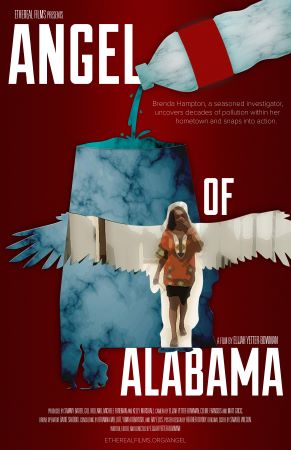
Angel of Alabama 2022
Distributed by The Video Project, 145 - 9th St., Suite 230, San Francisco, CA 94103; 800-475-2638
Produced by Sammy Bauer, Michelle Foreman, and Kelly Marshall
Directed by Elijah Yetter-Bowman
Streaming, 25 mins
High School - General Adult
Chemical industry; Environmentalism
Date Entered: 11/08/2023
Reviewed by Kay Hogan Smith, Retired - University of Alabama at Birmingham, Lister Hill Library of the Health SciencesIt has been observed that the antidote to powerlessness is action. This short documentary features one ordinary citizen, who, seeing a problem that no one else seemed equal to taking on decided to do so herself. Brenda Hampton grew up in rural Lawrence County, Alabama, along with her nine siblings. She moved to Massachusetts as an adult to work as a paralegal. On her visits back to her hometown, she noticed an unusually large number of kidney problems and cancer among the residents, including her mother and other relatives. When she herself was diagnosed with renal failure, it was clear to her that an environmental cause was to blame. In fact, it was the Tennessee River which had been polluted by 3M company for years with “forever chemicals” PFOS and PFOA.
Going up against a powerful manufacturing company is a daunting prospect for anyone, but Brenda’s determination and resilience is captured in an inspiring tribute in Angel of Alabama. We see her tirelessly advocating and providing practical assistance to her hometown, lugging cases of bottled water to residents. Along the way others join her campaign – including former Senator Doug Jones, who appears in a cameo – but it is under the undisputed leadership of Ms. Hampton. The film also features occasional input from officials such as the waterworks board leaders and from toxicology experts. The juxtaposition of innocuous advertising from McDonalds while Brenda explains how their food packaging contributes to the problem as it contains PFOS as well, illustrates how complex and widespread this environmental muddle extends. The film ends with a note of hope as McDonalds announces it is phasing out the use of forever chemicals in its packaging. However, Brenda presses on, determined to force accountability on 3M for its years of carelessness and obstruction which harmed over 100,000 in her home state. “You don’t have to kill people to make money,” she states emphatically.
This documentary should be a welcome showing for social studies classrooms as well as environmental organizations seeking to inspire their members, demonstrating that one needn’t be wealthy or well-connected to make a change in the world. Highly recommended.
Awards:Best Short Documentary, Longleaf Film Festival; Eric and Wendy Schmidt Awards for Excellence in Science Communications
Published and licensed under the Creative Commons Attribution 4.0 license. Anyone can use these reviews, so long as they comply with the terms of the license.